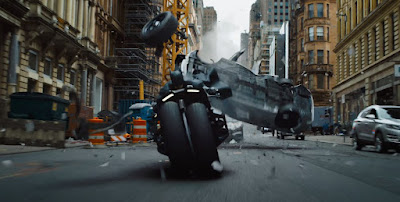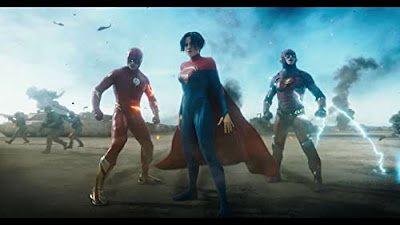or
Whatever Happened to The Scarlet Speedster?
Let's start with a bit of history: when I was a kid (and older), I loved "The Flash" comic books. The character had a lot of history, and (for some reason) was usually the lynch-pin for any big comics event. They re-invented the character (in the comics, his identity was police scientist "Barry Allen") with a more scientific basis to create what was dubbed "The Silver Age" of comics. In 1961, when "The Silver Age" Flash managed to traverse dimensions and meet "The Golden Age" Flash from the 1940's comics, it ushered in DC Comics Multiple Earths, a fictional representation of the Multiverse Theory. When sales of his comic weren't (shall we say?) "up to speed" the publisher decided to kill the character off in "Crisis on Infinite Earths" (designed to eliminate the multiple Earths and simplify the comics line for new readers.
Demand for the Silver Age Flash to be resurrected led to that happening, and then soon after DC decided to "re-boot" its entire line of comics (the idea was called "The New 52"), they decided the catalyst for the change would be The Silver Age Flash, who —due to the machinations of one of his villains—finds himself in an altered reality where he has no powers, there is no Superman, there is a Batman (but he's Thomas Wayne, as it was Bruce who was shot in the alley in that reality), there is a war going on between the Atlanteans and the Amazons, where Wonder Woman assassinated Aquaman, and so on. And the Flash has to fix all of it, and get it back to his reality...which of course, would be the "New 52" revamp. That all happened in a comics "event" called "Flashpoint"
Got all that? You might think that comics are stupid, but they sure can get complicated.
So, this movie, The Flash, has its origin-bones in that "Flashpoint" story but grafts it into the DC Movie Universe sticking to the one "changing history" aspect of it and going its own way. In it, Barry Allen (Ezra Miller), on the eve of a potentially losing appeal by his father (Ron Livingston now)—in prison for being falsely convicted of killing his wife, Barry's mother (Maribel Verdú*)—discovers that he can go back in time, and, in fact, pick-and-choose many time-lines, and affect what has happened in his past. Cautioned by Batman/Bruce Wayne (Ben Affleck) that he could haphazardly "destroy...everything," Barry figures out a way that he can alter events without actually being seen or interacting with that time-line in order to prevent his mother's murder.
Yeah, well, going back in time to change things is...never easy. In fact, the only thing tougher is pleasing a rabid movie/comic fan-base with singular expectations of what would make a "good" Flash movie—is it related to the TV show? ("why not?"), Michael Keaton's Batman is in it? How about Val Kilmer's? ("why not?") What about "poor" Henry Cavill?—and for every "slight" to their expectations, the "Rotten Tomatoes" meter will drop closer and closer to a green blotch (as if that mattered). No, The Flash will not meet an awful lot of people's "wish lists." It's not world-building. Quite the opposite. It's not setting up the next chapter of a franchise (like we're used to). It is a self-contained story that could conceivably not have—or need—a sequel. It's just considering the possibilities. It's what DC used to call in the Silver Age "An Imaginary Story." Writer Alan Moore ("Watchmen," "V for Vendetta," "Batman: The Killing Joke," "From Hell") had the best rejoinder: "Aren't they all?"
So, how is it? I'll use a word that hasn't been much used since comic-movie-makers have been striving to make their super-heroes "credible"—"Let's dress them in leather!" "Let's make them bad-asses!"—it's hilarious.
And hilarious in a good way! From it's opening sequence where Barry Allen (Miller) aka "The Flash" must spend an excruciating amount of time waiting for his carb-filled PB&J order and gets interrupted by a call from the Justice League (well from Wayne butler, Alfred—Jeremy Irons) to race over to Gotham City where thieves have stolen a toxin from a local hospital. Thieves being so smart they're dumb, they've managed to undermine the foundation of the hospital where it's at the brink of collapse. While Bat-fleck goes after the thieves, Barry-Flash must save the people trapped in the hospital. What ensues is a sequence straight out of Rube Goldberg by way of Buster Keaton, as The Scarlet Speedster, must save falling babies out of maternity ward by "any means necessary." And in Barry's perceived bullet-time, all those babies each have their own individual perils that he must solve in the—to him—excruciatingly long time it takes them to fall.
Director Andy Muschietti has filled the sequence with such giddy malice that one cannot take any of it too seriously, especially when he and scenarist Christina Hodson build on the sequence, complicating it with more dangers that Flash has to solve. Sure, Batman gets to use all his toys for an extended chase, that strains credulity, dragging him along Gotham highways in the sturm-and-drangy way we've become accustomed to, but The Flash sequence sets up an atmosphere that dilutes suspense in favor of a pell-mell momentum that's rather exhilarating.
We'll stop there for a synopsis over-view because to say anything more would be like spoiling the punch-line of a joke. It's not as funny—or, at its core, surprising—if you can anticipate how it all ends. There are just too many twists and turns and laterals and feints that will be telegraphed, ruining little moments and small that are intended to take you places you had no idea were coming, or even existed. If you think you know what's coming, you're just wrong, even for all the hints and speculations that leaked out in the marketing.
Key to making this work is Ezra Miller. I've always had problems seeing him as The Flash and his presentations in both versions of Justice League (but especially Joss Whedon's) where he was a manic goof-ball and grating comic relief. But, Miller comes out of his supporting-role comfort zone and proves that he can carry a big splashy movie with amazing ease. And he's a hell of a performer, playing two versions of the same character, but with two different histories and stages of development. That's a trick in itself, but Miller makes it look easy, with a gutsy level of letting himself look stupid without losing the basic integrity of the character and making the drama and emotion of the thing work. And for all the manic energy that he throws out, he still manages to have one of the best dead-pan reactions for comedy. Say what you will about him (and everybody has!), but he's just damned good in this.
What else are people talking about? Oh...cameos! Yes, there are cameos, both voluntary and not. And, yes, Keaton is great—he always is. And the "Supergirl" we're introduced to (Sasha Calle) is terrific.
And the special effects? There's been a lot of kvetching about that, but an early sequence in what will be called the chrono-globe (or some such—maybe we should call it "The Uncanny Valley?") sets up a non-photo-realistic quality that carries out throughout the rest of those sequences (assuming that's what everybody is talking about—I have no previous experience with what constantly shifting time-lines actually look like, so I couldn't judge!) that generally smudges perceptions of what we think we should be seeing.I could quibble with a prolonged sequence based on Man of Steel where Michael Shannon seems less than engaged, but director Muschetti has always had an observable weakness when it comes to big set-pieces. One would have thought if he could juggle a bunch of falling babies, he could handle a super-hero slug-fest on four fronts, but it falls just shy of being super. I wasn't crazy about the "never-ending battle" in Man of Steel for that matter.But, was I entertained? Heck, yeah. As much as when I used to close the cover of a good comic-book. So much so that I didn't mind when Muschetti pulls off a final "gotcha" that was just as amusing as its meant to be, upending people's pre-concieved notions and messing with their minds. It's a story, after all. One with limitless possibilities and a perverse willingness to "go there."
Aren't they all?
* One of the many joys of The Flash is to see Verdú again, who was in Coppola's Tetro, del Toro's Pan's Labyrinth, and Y Tu Mama Tambien.














No comments:
Post a Comment